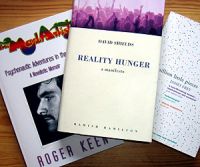Mad Art and Reality Hunger
 |
The Mad Artist looks at drug memoirs, real and fake, in the light of reading David Shields' excellent book 'Reality Hunger'.
It’s always heartening to discover another writer who, perhaps by taking a very different path, has nonetheless arrived at a very similar creative place to oneself. This happened when I saw David Shields being interviewed on a BBC arts programme about his book 'Reality Hunger' and the broader implications of the concept... As a drug memoirist, I had a special interest because I knew from the interview that this is an area Shields touches upon, and to my mind drug writing is an important component in the spectrum of this push toward ‘reality’. Indeed he mentions the Vedas--citing them as the earliest examples of written storytelling--and also De Quincey, Burroughs and Hunter S. Thompson before getting stuck into James Frey and his infamous tome 'A Million Little Pieces'. Here is one of the finest examples of an ideological clash between ‘reality’ and ‘fiction’ in a contemporary book. Telling the story of a hopeless, burnt-out, twenty-three-year-old drug addict, who mends himself in a rehab centre, Frey firstly wrote the book as a novel, and when he had no success at marketing it, he rebranded it as memoir, after which it was outstandingly successful, selling in the millions.
|

Recently @ DoseNation
|
|






















The comments posted here do not reflect the views of the owners of this site.